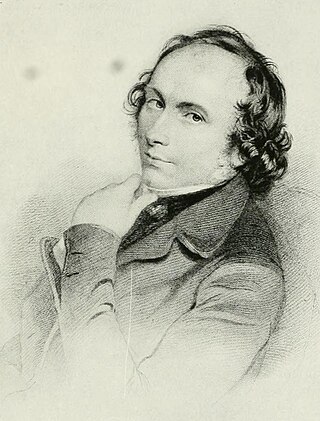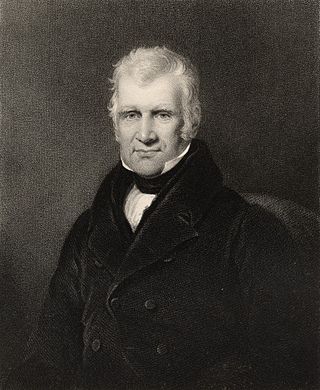Related Research Articles

Elizabeth Garrett Anderson was an English physician and suffragist. She was the first woman to qualify in Britain as a physician and surgeon. She was the co-founder of the first hospital staffed by women, the first dean of a British medical school, the first woman in Britain to be elected to a school board and, as mayor of Aldeburgh, the first female mayor in Britain.

John William Polidori was a British writer and physician. He is known for his associations with the Romantic movement and credited by some as the creator of the vampire genre of fantasy fiction. His most successful work was the short story "The Vampyre" (1819), the first published modern vampire story. Although the story was at first erroneously credited to Lord Byron, both Byron and Polidori affirmed that the author was Polidori.

Sir Andrew Clark, 1st Baronet, was a Scottish physician and pathologist.

James Parkinson was an English surgeon, apothecary, geologist, palaeontologist and political activist. He is best known for his 1817 work An Essay on the Shaking Palsy, in which he was the first to describe "paralysis agitans", a condition that would later be renamed Parkinson's disease by Jean-Martin Charcot.

Richard Russell was an 18th-century British physician who encouraged his patients to use a form of water therapy that involved the submersion or bathing in, and drinking of, seawater. The contemporary equivalent of this is thalassotherapy, although the practice of drinking seawater has largely discontinued.

William Stokes was an Irish physician, who was Regius Professor of Physic at the University of Dublin. He graduated from the University of Edinburgh Medical School with an MD in 1825 later returning the practice in Dublin at Meath Hospital. He went on to create two important works on cardiac and pulmonary diseases – A Treatise on the Diagnosis and Treatment of Diseases of the Chest (1837) and The Diseases of the Heart and Aorta (1854) – as well as one of the first treatises on the use of the stethoscope. He emphasised the importance of clinical examination in forming diagnoses, and of ward-based learning for students of medicine.
The London School of Medicine for Women (LSMW) established in 1874 was the first medical school in Britain to train women as doctors. The patrons, vice-presidents, and members of the committee that supported and helped found the London School of Medicine for Women wanted to provide educated women with the necessary facilities for learning and practicing midwifery and other branches of medicine while also promoting their future employment in the fields of midwifery and other fields of treatment for women and children.

Richard Gordon, was an English ship's surgeon and anaesthetist. As Richard Gordon, Ostlere wrote numerous novels, screenplays for film and television and accounts of popular history, mostly dealing with the practice of medicine. He was best known for a long series of comic novels on a medical theme beginning with Doctor in the House, and the subsequent film, television, radio and stage adaptations. His The Alarming History of Medicine was published in 1993, and he followed this with The Alarming History of Sex.

Sir John Forbes FRCP FRS was a distinguished Scottish physician, famous for his translation of the classic French medical text De L'Auscultation Mediate by René Laennec, the inventor of the stethoscope. He was physician to Queen Victoria 1841–61.

John Coakley Lettsom was an English physician and philanthropist born on Little Jost Van Dyke in the British Virgin Islands into an early Quaker settlement. The son of a West Indian planter and an Irish mother, he grew up to be an abolitionist. He founded the Medical Society of London in 1773, convinced that a combined membership of physicians, surgeons and apothecaries would prove productive. As the oldest such in the United Kingdom, it is housed in London's medical community at Lettsome House, Chandos Street, near Cavendish Square. Lettsom was its mainstay, as founder, president and benefactor.

Thomas Richard Allinson was an English physician, dietetic reformer, businessman, journalist and vegetarianism activist. He was a proponent of wholemeal bread consumption. His name is still used today for a bread popular in Europe, Allinson bread.

John Gregory, a.k.a. John Gregorie, was an eighteenth-century Scottish Enlightenment physician, medical writer and moralist.

Thomas Percival was an English physician, health reformer, ethicist and author who wrote an early code of medical ethics. He drew up a pamphlet with the code in 1794 and wrote an expanded version in 1803, Medical Ethics; or, a Code of Institutes and Precepts, Adapted to the Professional Conduct of Physicians and Surgeons in which he coined the expression "medical ethics". He was a founding subscriber of the Portico Library in Manchester and a pioneering campaigner for public health measures and factory regulation in the city.

Henry Clutterbuck M.D. (1767–1856) was an English medical writer.
John Warner was an English academic, cleric, and physician. He was the first Regius Professor of Physic at the University of Oxford, as well as the Vice-Chancellor of the University of Oxford and the Dean of Winchester.

William Falconer was an English physician, miscellaneous writer, and also Fellow of the Royal Society.
John Whitehead (1740?–1804) was an English physician and lay preacher, known as a biographer of John Wesley.

William George Maton M.D. was an English physician, a society doctor who became associated with the British royal family. He published on natural history and antiquarian topics.

Samuel Foart Simmons, FRS was a British physician.

John Redman Coxe was a physician and professor of medicine at the University of Pennsylvania.
References
 This article incorporates text from a publication now in the public domain : "Anderson, John (d.1804)". Dictionary of National Biography . London: Smith, Elder & Co. 1885–1900.
This article incorporates text from a publication now in the public domain : "Anderson, John (d.1804)". Dictionary of National Biography . London: Smith, Elder & Co. 1885–1900.